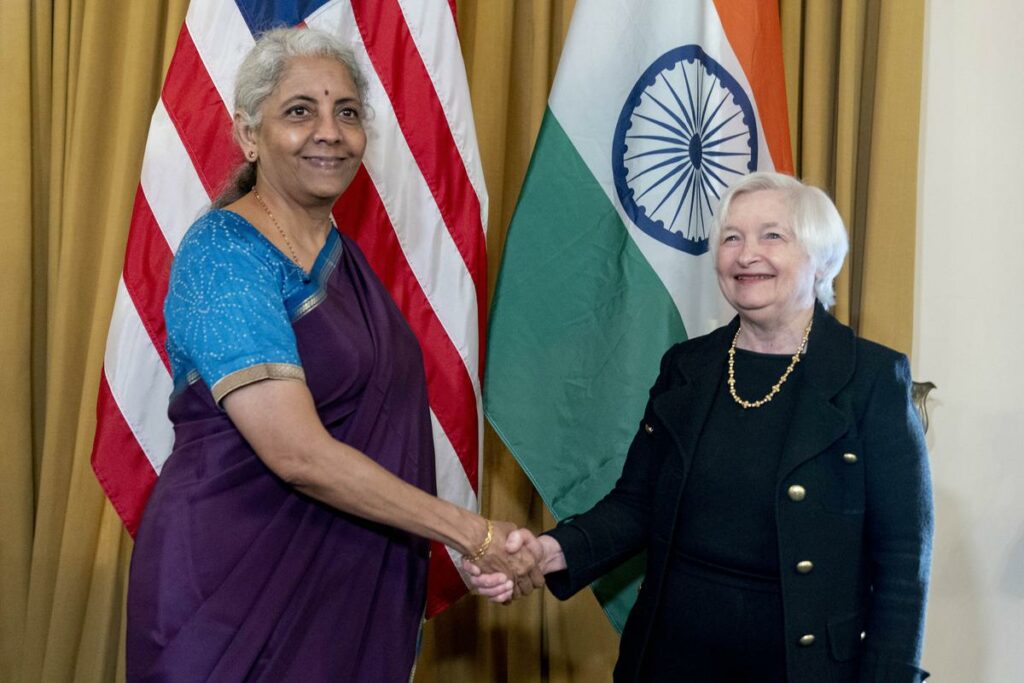Virendra Pandit
New Delhi: Amid grim forecasts of a global recession, shortages, and high prices, and India facing the twin challenges of slowing growth rate and high inflation, Finance Minister Nirmala Sitharaman on Tuesday said her next Budget for the financial year 2023-24 would be ‘very carefully structured’ to help the country’s economy sustain growth momentum and rein in prices.
Sitharaman will present India’s annual budget on February 1 next year for the fiscal starting April 2023.
The FM, currently in Washington to attend the annual meetings of the International Monetary Fund (IMF) and the World Bank, identified high energy prices among the biggest problems facing the Indian economy soon.
“Specifics (of the next budget) may be difficult to go into at this stage because it’s a bit too early. But broadly, the growth priorities will be kept absolutely on the top. Inflation concerns will have to be addressed,” Sitharaman said, responding to a question in a chat with eminent economist Eswar Prasad at the prestigious Brookings Institute, the media reported on Wednesday.
Because of the Reserve Bank of India (RBI)’s tighter monetary policy impacting demand and the economy facing headwinds from a global slowdown, almost all institutional and private forecasters have cut their projections for India’s GDP growth in the current fiscal that will end on March 31, 2023.
“The next budget will have to be a very carefully structured one in which growth momentum will have to be sustained,” she added.
Sitharaman said the government is carefully watching the global stress hitting India to spiral prices of energy, fertilizer, and food, and making sure it doesn’t get passed on to the people.
The excise duty on fuel was brought down recently to make sure the common citizen doesn’t bear the brunt of increasing fuel prices.
The growth momentum in the Indian economy, which was encouraging as the country climbed out of the pandemic months early this year, appears to be waning now as industrial production and exports slowed down. Inflation has hovered above the tolerance limit of 6 percent for months, prompting the RBI to hike interest rates to dampen demand.
The ongoing Russian war in Ukraine has pushed up energy prices and raised concerns about slowing down India’s post-pandemic economic recovery. The weakening of the rupee has added to the woes as it raises the cost of imports.
India is 85 percent dependent on imports to meet its oil needs and roughly half of its gas requirement.
The RBI last month cut its projection of India’s GDP growth in the current fiscal from 7.2 percent to 7 percent. Other rating agencies also lowered the economic growth projection for India, citing the impact of geopolitical tensions, tightening global financial conditions, and slowing external demand.
On Tuesday, Sitharaman met with her American counterpart Treasury Secretary Janet Yellen, and discussed a range of issues, including bilateral relationships, the global situation as well as India’s upcoming G-20 Presidency.
“The two leaders discussed the current global macroeconomic situation among other issues of mutual interest,” the Finance Ministry said after the meeting.
Sitharaman invited Yellen to India to attend the US-India Economic and Financial Partnership meeting in New Delhi on November 11. This will be her first visit to India as Treasury Secretary.
Describing the two ministers’ meeting as “substantive”, India’s Ambassador to the US, Taranjit Singh Sandhu, said: “Deepening bilateral economic partnership and cooperation in multilateral forums were discussed.”

